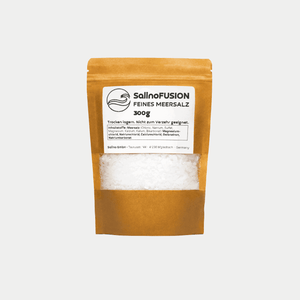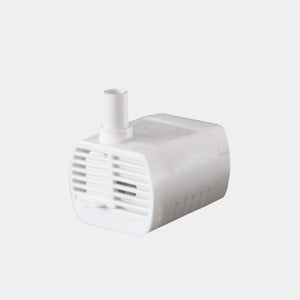Salt air between the Baltic Sea and the Recknitz Valley

When you think of Mecklenburg-Western Pomerania, the Baltic Sea, the Mecklenburg Lake District, and expansive landscapes immediately come to mind. But the state between the Elbe and Oder rivers also harbors a lesser-known history: the history of salt. Places like Bad Sülze are reminders that brine was extracted here for centuries and processed into valuable salt—a precious commodity that has shaped entire regions.
Today, the large saltworks have disappeared, but in some places, the tradition can still be experienced. Graduation towers and salt therapy facilities keep the memory alive and at the same time offer something that is becoming increasingly valuable in our fast-paced times: pure, salty air to breathe. A visit to Mecklenburg-Western Pomerania's graduation towers is not only a journey into history, but also a respite for body and soul.
But as everywhere, every excursion involves planning, travel time, and expense. Anyone who regularly seeks out salty air sooner or later asks themselves: Is there a way to integrate this soothing atmosphere into their daily routine? But before we explore this alternative, let's head to the salt towns of Mecklenburg-Western Pomerania.
Bad Sülze - Where history meets salt air
About 30 kilometers south of Stralsund, nestled in the gentle landscape of the Recknitz Valley, lies Bad Sülze – a town whose name already reveals what it's all about: salt. For almost two centuries, salt production shaped the townscape. Enormous graduation towers once towered above the town, their wooden structures with windmills mounted on top visible from afar.
The history of the Sülze saltworks begins in the early 18th century. A total of six graduation towers were built, with names such as "The Long Building," "Eckgardier Building," and "Friedrichs Building." The total length of all the graduation towers was over 1.3 kilometers—an impressive ensemble that spanned the Recknitz River and shaped the townscape. Brine trickled down these massive blackthorn walls, initially with a salt content of only five percent. Through repeated graduations, the concentration could be increased to up to twenty percent—a process that significantly saved fuel during later boiling.
But salt production was not without its risks. In 1944, a lightning strike destroyed the last large graduation building, the Friedrichsbau, which at that time already served as an open-air inhalation facility for spa guests. In the postwar period, the building fell into disrepair and was demolished in the early 1970s. For a long time, what had once been the city's economic foundation was nothing but history.
The graduation tower in the museum garden
In 2019, something special was created in the museum garden of the Bad Sülze Salt Museum: a functioning graduation tower that revives the tradition. Although smaller than the monumental historical structures, it operates according to the same principle. Blackthorn twigs form a dense wall over which natural brine trickles. The water evaporates, and a fine salty mist settles over the surrounding area—a relief for the respiratory system.
The graduation tower is embedded in the museum's approximately three-hectare outdoor area, which has been converted into a small open-air museum. Together with the replica of the brine drinking pavilion, it embodies both the health and economic aspects of the former "Stadt Sulta," as Bad Sülze was formerly known.
Visitors can inhale salty air here for free—an experience that unfolds its full effect especially in the morning and evening hours, when the air is still cool and the surroundings are quiet. The fine saline mist clears the respiratory tract, moistens the mucous membranes, and creates an atmosphere reminiscent of a stroll by the sea—in the middle of the country.
The Salt Museum itself is the only one of its kind in Mecklenburg-Western Pomerania. Since 1971, it has been located in the former office building of the Grand Ducal Saltworks, the "Old Salt Office," dating back to 1759. The exhibition tells the story of salt production, the saltworks, and the town of Bad Sülze. In the museum garden, the "Timm'sche Garten"—a beautiful dahlia garden—also invites visitors to linger.
For visitors from Rostock, Stralsund, or Greifswald, Bad Sülze is an ideal day trip destination: a 30-40-minute drive takes you into another world. The graduation tower is open year-round, and the museum itself has seasonal opening hours. A visit can be perfectly combined with a stroll through the spa gardens, restored in 2022—a place that invites you to take a deep breath.
Salt Manufactory Trinwillershagen - Salt therapy in the heart of the bird park region
About 20 kilometers south of Stralsund, nestled in the idyllic Recknitztal bird sanctuary region, lies Trinwillershagen – a small village that has become a special place for salt lovers. The Mecklenburg-Vorpommern Salt Manufactory has settled here, a "little salt kingdom," as the operators themselves call it.
The salt factory is more than just a shop: it's an experience for all the senses. Salt is everywhere – to touch, to taste, to discover, and to buy. At the center of this salt kingdom stands the salt tower – the heart of the complex and an impressive structure that combines tradition and modernity.
The salt tower - 32 tons of natural salt and a 7-meter-high graduation tower
The Salt Tower is an extraordinary space: 32 tons of natural salt were used here, and the walls are clad with backlit salt stones. The play of colors from the lighting, the gentle trickling of the water, and romantic natural sounds create an atmosphere of deep relaxation—even before the actual effects of the salt air set in.
The most remarkable feature is the 7-meter-high indoor graduation tower , which extends over two floors. It works according to the classic principle: brine is channeled from above over blackthorn branches and trickles down. With each impact of a water droplet on the branches, the droplet is broken up again, creating a fine brine mist that enriches the entire room with salt aerosols.
The graduation tower is complemented by ultrasonic saline nebulization, which releases additional fine salt particles into the air. The result is a highly concentrated saline atmosphere—a true elixir for people with respiratory illnesses, skin problems, or simply for anyone who wants to escape from everyday life for a while.
Salt therapy in the salt tower works on several levels: The saline aerosols clear the airways, moisturize the mucous membranes, and, with regular use, can strengthen the immune system. At the same time, the meditative atmosphere of the room—subdued lighting, gentle sounds, the soothing trickling of water—provides deep relaxation for body and mind.
Salt factory and salt café
The Trinwillershagen Salt Manufactory, however, is more than just a place for salt therapy. Natural salts are processed and refined here, and sold in the farm shop and online shop. Informative workshops, events, and exclusive tours of the manufactory take place year-round. In the Salt Café, you can take a break and—in keeping with the theme—taste salt in all its diversity.
Trinwillershagen's location is idyllic: the village lies at the center of the old salt road in the Recknitztal bird sanctuary region, very close to the magnificent Schlemmin Castle and the Ostseemühle oil factory. The area invites you to long walks and bike rides—perfect for combining a visit to the salt tower with a day in nature.
For visitors from Rostock (approx. 45 km), Stralsund (approx. 20 km), or Greifswald (approx. 35 km), Trinwillershagen is easily accessible and a worthwhile destination for a half-day or a relaxing day trip. Advance bookings for salt therapy sessions are recommended.
Conclusion: Salt air between the Baltic Sea and the Recknitz Valley

The graduation towers and salt therapy facilities in Mecklenburg-Western Pomerania demonstrate that the tradition of salt production has not been forgotten—even though the large saltworks have long since disappeared. In Bad Sülze, history comes alive when you stand in front of the reconstructed graduation tower and breathe in the fine saline mist. In Trinwillershagen, on the other hand, tradition blends with modern wellness culture as you find peace and quiet in the salt tower beneath the 7-meter-high graduation tower.
Both places tell stories—of a time when salt was still a precious commodity, of people who dedicated their lives to salt production, and of a region still shaped by this tradition today. Bad Sülze, with its open-air graduation tower in the museum garden, and Trinwillershagen, with its impressive indoor salt tower, each offer very different but equally valuable experiences: one under the open sky, immersed in history and nature, the other in a concentrated, meditative atmosphere.
The alternative for everyday life
This is precisely where many people start thinking: Couldn't the beneficial effects of salty air be integrated into their daily lives? A mini-saltworks brings the principle of large graduation towers to the home in a compact form. It creates salty air regardless of the weather, season, opening hours, or travel distance.
Compared to the ongoing costs of regular trips to graduation towers or salt therapy facilities, a high-quality mini-saltwork often pays for itself within the first year. With monthly expenses of €40-80 (travel costs plus admission), the annual return is €480-960—an investment that can be redirected toward a home-based solution.
The graduation towers in Bad Sülze and the salt tower in Trinwillershagen remain special places for conscious time-outs—places worth visiting again and again to experience the unique atmosphere and history. The local mini-saltworks, on the other hand, become a quiet companion in everyday life: in the morning after waking up, in the evening before going to bed, while working from home.
Both worlds—the experience at Mecklenburg-Western Pomerania's historic and modern saltworks and the daily salt air at home—complement each other perfectly. The graduation towers are cultural heritage, a destination, and inspiration. The mini-saltworks is a daily health care solution and a practical everyday solution. Together, they form a concept that combines tradition and modernity, special moments and everyday care.
Thus, salt air does not remain just a precious commodity from times gone by, but becomes a part of life - available, soothing and liberating whenever you need it.
(Image sources: Adobe Stock)



